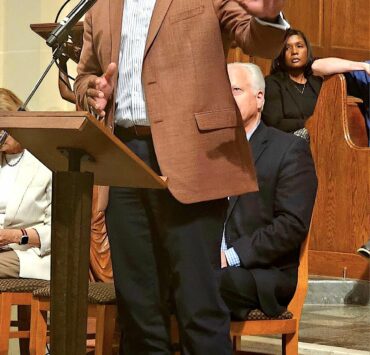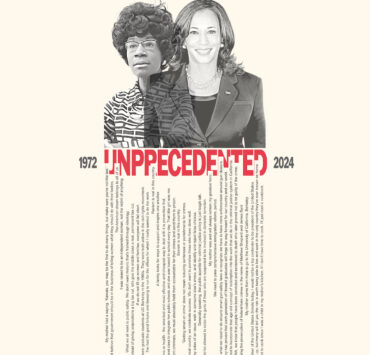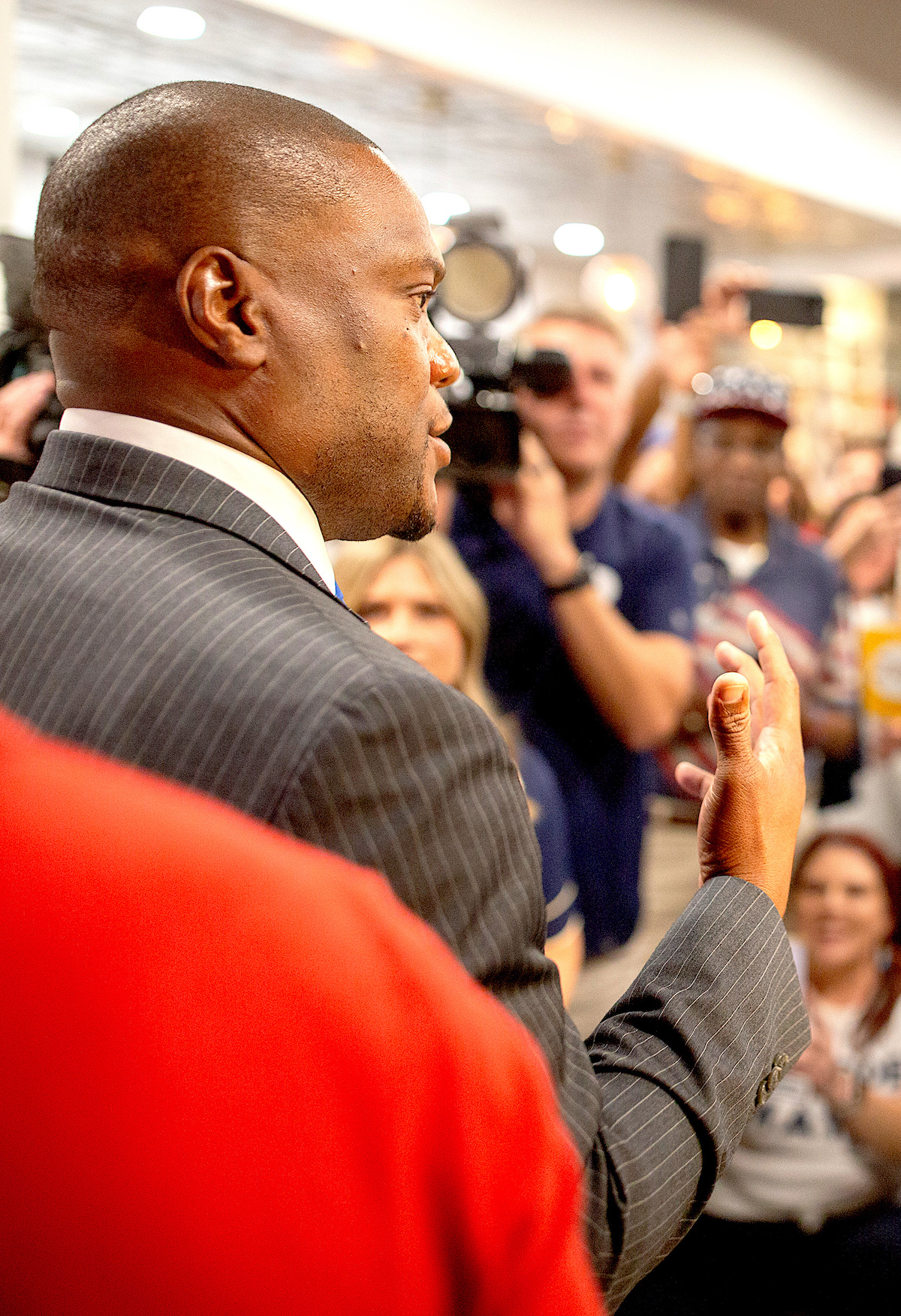
POLITICS
Kimberly Marsh & Sam Levrault, The Oklahoma Eagle
Okla. State Rep. Monroe Nichols (D-72), Tulsa mayoral candidate, speaking to supporters as election results are published during a watch party on Aug. 27. Photo, Basil Childers, The Oklahoma Eagle
Monroe Nichols edged ahead of Tulsa mayoral candidates Karen Keith and Brent VanNorman on August 27, earning more votes than each competitor, but falling short of the 50 percent plus one needed to secure victory. The forced runoff between Nichols and Keith will be settled by Tulsa County voters during the November 5 general election.
Tuesday night’s results showed that Nichols’ bid to become Tulsa’s first Black mayor has gained remarkable momentum in recent weeks. Nichols won with 18,729 votes or 33.10 percent. Keith followed with 18,457 votes or 32.62 percent of the total votes tally. VanNorman, a relative newcomer to Tulsa, tallied 18,019 votes for 31.84 percent of the total votes.
As the reporting of results came to a close, Nichols rallied his volunteers to continue their efforts through Nov. 5.
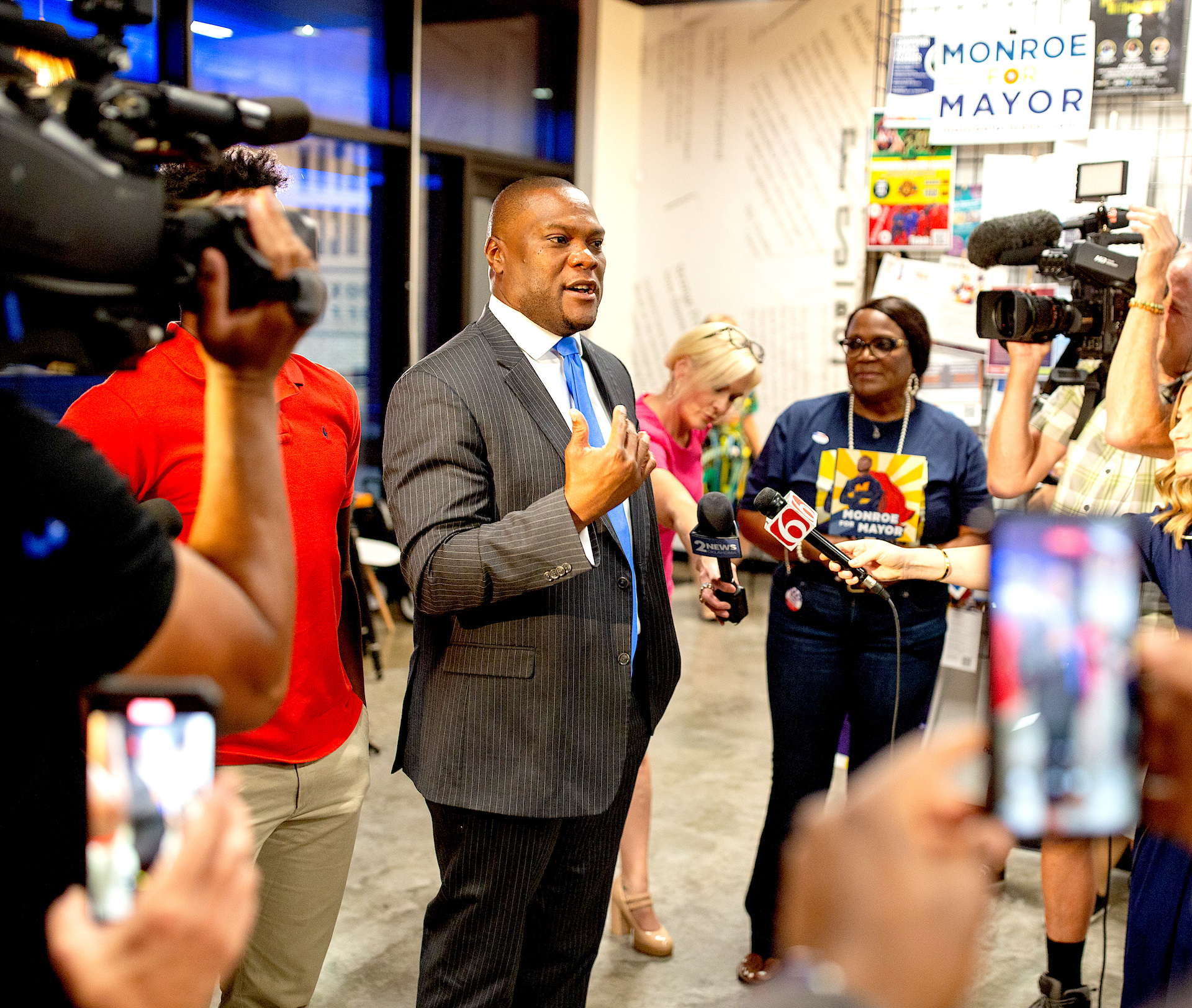
“I hope that you are ready to get up tomorrow, and you’re ready to fight, you’re ready to knock, and ready to call,” he told a high-spirited watch party at The Fulton Street Bookstore in the Greenwood District of north Tulsa. “November will be here before you know it. And November is all about making history.”
In an interview with The Oklahoma Eagle, Nichols said he was not surprised by the election results, and over the next two months, his campaign will continue to do more of the same because it’s working.
“I think we did well tonight because we’ve talked about the future. We’ve talked about how we get there,” he said. “We’ve engaged people all across the city.
I have been out front on issues facing the community since the day I first got elected. That’s not going to change – my commitment to improving student outcomes, my commitment to advancing economic opportunity, my commitment to making sure this is the safest big city in the country. I think it’s going to uplift the community in ways it just hadn’t been uplifted.”
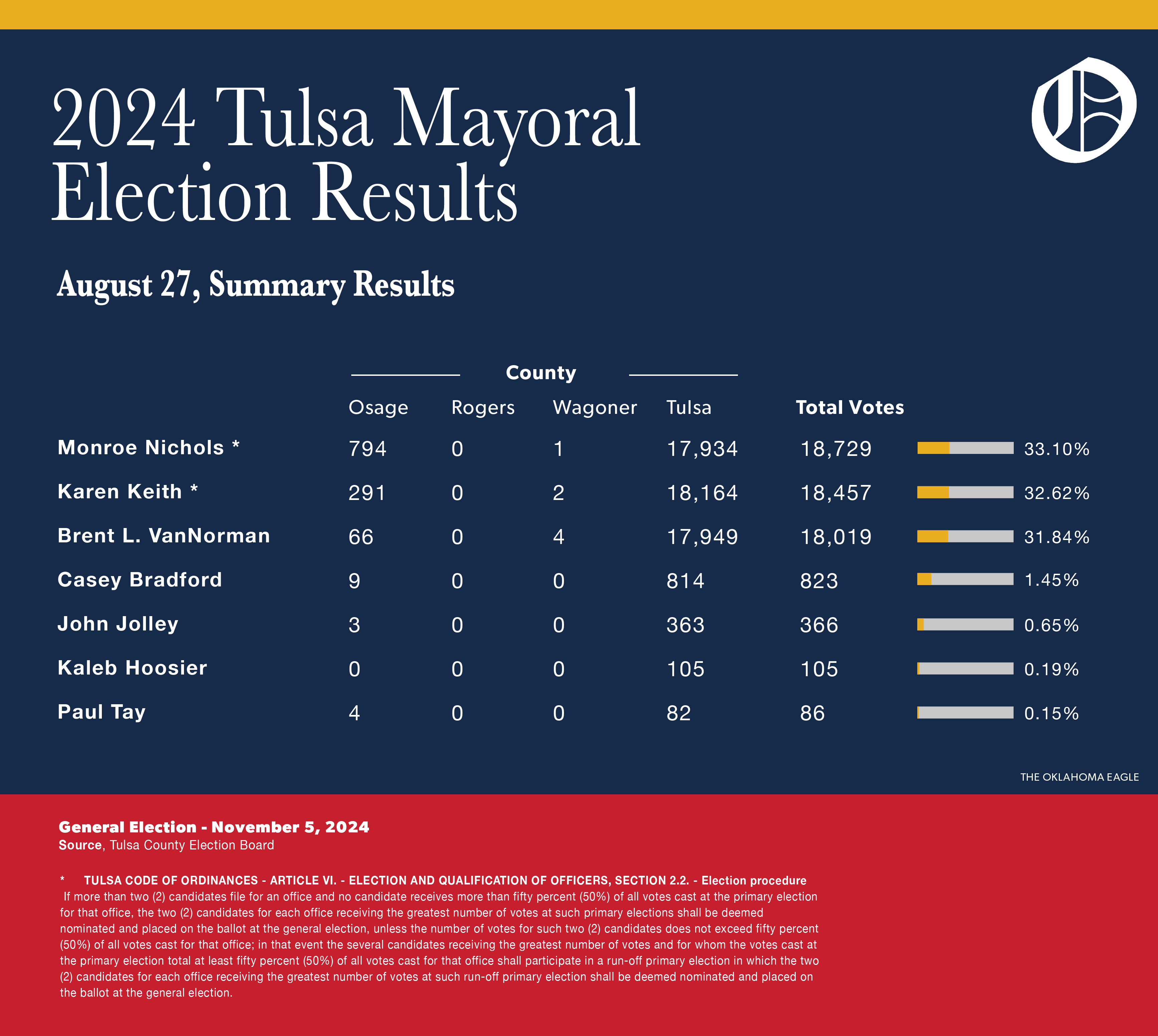
The final tallies in Tuesday’s balloting showed candidate Casey Bradford as the next closest with just 1.45 percent. Kaleb Hoosier, John Jolley, and Paul Tay earned less than one percent of the votes.
Nichols’s supporters pointed to his strategies for addressing homelessness, tribal relations, and education as their primary motivations.
Former Mayor Kathy Taylor endorsed Nichols, a former employee at the City of Tulsa. Taylor also came to the watch party to show her support.
“Monroe is the best leader for the future of the city of Tulsa. He’s got a plan. He has the courage. He’s going to lead this city and the generations to come into the future,” she said in an interview with The Oklahoma Eagle. “He’s got to let all the citizens of the city of Tulsa know that he’s a mayor for everyone. He’s going to bring our city to the next level.”
During the watch party, other Nichols supporters gave their testimonials.
Lisa Robertson’s daughter worked with Nichols as an intern at the City of Tulsa, leaving a lasting impression and deep appreciation for Nichols.
“We’re for Monroe because he has a plan for the homeless and education,” said Robertson in an interview with The Oklahoma Eagle. “He’s the only one talking about education.”
Roselly Frater moved to Tulsa with her husband and baby to seek venture capital opportunities. She believes Monroe Nichols is the key to this success. Frater is excited about Nichols’ clear vision for addressing homelessness, an issue close to her heart, and improving the education system, which is vital for her young child.
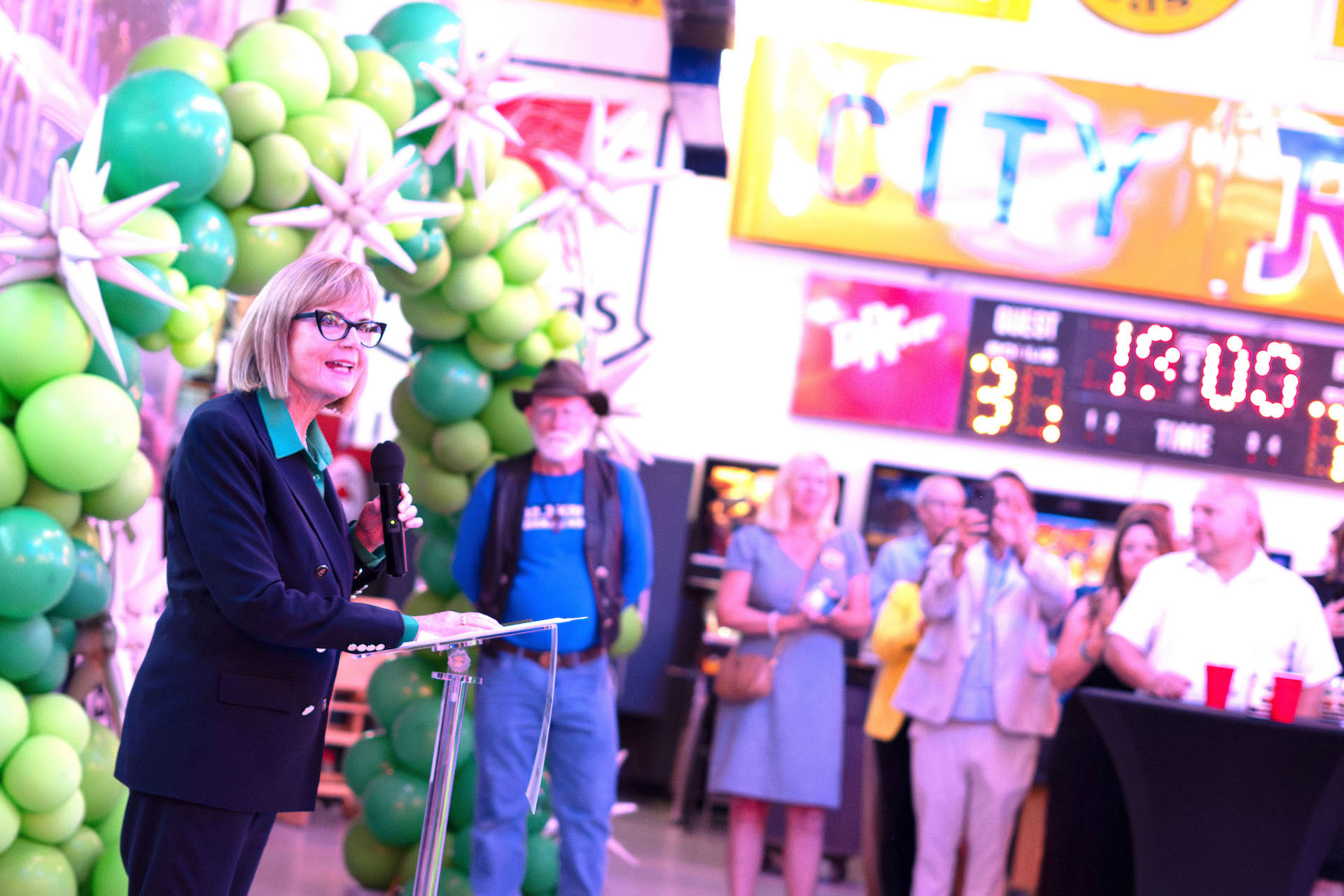
About 10 miles away at the Stokely Event Center, Keith, surrounded by neon lights, encouraged her volunteers to “keep on keeping on.”
“We’ve spent the past months traveling across the city. We’ve been hearing your concerns, your hopes, and your dreams for Tulsa, and what I’ve heard loud and clear is that Tulsans want leadership that will bring people together. We built a campaign focused on creating a safer, stronger, and more prosperous Tulsa, from investing in public safety and supporting our schools to addressing homelessness and cutting the red tape that slows down progress. We have laid out a very clear vision for the future, and now we have the opportunity to take that vision to the finish line in November.”
Other issues on the Ballot
Proposition No. 1, 2024 Proposed City Charter Amendment – City Councilors’ Salaries
Voters approved Proposition 1, an amendment to the Charter of the City of Tulsa to increase city councilor salaries from $24,000 to $32,000 and provide for consumer price index adjustments.
Proposition No. 2, 2024 Proposed City Charter Amendment – City Auditor’s Salary
Voters also approved a charter amendment to increase the City auditor’s salary from the equivalent of 70 percent of the Mayor’s salary to 75 percent. The City Councilors passed an ordinance in April raising the Mayor’s salary from $105,000 to $190,000, effective Dec. 2.
Nathan Pickard, who ran uncontested, will succeed retiring City Auditor Cathy Carter. He will assume the office on Dec. 2 with a new $142,500 salary, up from $73,000.
Pickard is the founder of 9b, a certified B Corporation that provides data and analytics solutions, and the co-founder of ThirdLine, an analytics software for government auditors and financial management to find risk, stop fraud, create quick audit reports, decrease waste, and discover cost savings. He has 18 years of internal auditing and data analytics experience and has been a national speaker for the Association of Local Government Auditors (ALGA) and the Institute of Internal Auditors.
How did the two top candidates distinguish themselves?
Keith is a collaborator, a navigator, a listener who would help people find solutions, a visionary, and a former mayoral aide instrumental in launching the Vision 2025 capital improvement series. As a county commissioner, Keith has worked to address infrastructure issues, such as securing funding to rebuild the levees that protect property from flooded Arkansas River waters, as experienced in 2019.
Nichols, a state legislator and planner who said he puts his plans into print to promise accountability, is a policymaker who also says he has introduced house bills that would help North Tulsa residents. Nichols worked in public education and career tech before co-founding a cradle-to-career educational collective, Impact Tulsa, created to convert data into systemic change.
In early August, The Oklahoma Eagle posed questions to candidates regarding safety in the Black community and their experience in representing issues important to north Tulsa, such as affordable housing. The following is a synopsis of their responses.
Keith said she has immersed herself in the history of Black Wall Street, reading at least six historical accounts, including the most recent “Built From Fire,’ by Victor Luckerson, featured in The Oklahoma Eagle.
“I have been very engaged as we work to commemorate what happened in ‘21. I care deeply about…making sure we don’t forget, and we, as a city, cannot forget what happened.
I want to see more investment in North Tulsa. I’m very excited about Kirkpatrick Heights. I’m very excited about the Rudisill North library and what that’s going to bring to the area and t getting the National Monument.”
Federal legislation has been introduced to create a National Monument in the Greenwood District that would delineate the historical boundary of the Greenwood neighborhood in North Tulsa, also protecting Black Wall Street as part of the National Park Service network. Keith said the monument, combined with the Oklahoma Senate-supported plans for a Civil Rights Trail highlighting Oklahoma Black towns and Native American sites of historic significance, are two of her priorities to improve the Greenwood experience.
“There’s just so many good things happening, and I want to be a part of that and continue to see the district thrive.”
Keith said the first thing to do for a safer city for Black Tulsans is to turn the streetlights back on in some of the neighborhoods and work to post crossing guards on arterial streets near public schools, noting that one item on the ACTION Tulsa agenda is a crossing guard for 21st Street accessing Nathan Hale Middle School and MacArthur Elementary School.
“I also think we need to have we don’t have as many police on the streets as we need. So I’m hoping I can help with recruiting so we can have additional feet on the streets to ensure every neighborhood feels safe.”
Addressing stray dogs in Tulsa neighborhoods, especially around walkways to schools, is also a top priority on the ACTION Tulsa agenda. ACTION Tulsa represents 36 organizations around Tulsa and compiles its agenda by listening to what residents want.
How do you plan to tackle affordable housing?
“This is my number one issue. We have developers who will no longer work within the city limits of Tulsa because our permitting and inspection processes are very difficult.”
Keith explained that the process for developers is arduous, despite years of repeated attempts over 20 years of mayoral efforts to address the problem. By the time the developers emerge from the permitting process, building homes that are affordable to lower and middle-income buyers is no longer achievable, Keith said.
She said she is identifying the secret sauce.
“I have identified the most talented people that I can find to help me fix some of these issues.
I have got all the development community behind me and they are helping me to understand what they need to be successful.”
In her additional comment, Keith reiterated the importance of the Greenwood District and told Tulsans to be familiar with the site’s 1921 Black Wall Street Massacre history.
Concerning addressing issues important to Black Tulsans, Nichols immediately pointed to his experience serving as the chair of the Oklahoma Legislative Black Caucus, where he said he has led every issue from equity funding for Langston to Representative Daniel Goldman’s work to try to get scholarships for Descendants of the race massacre.
He said he has worked his entire political career on the issues around the country that now impact Tulsa, including affordable housing and education and narrowing the life expectancy gap between white citizens and people of color in Tulsa. He cited work on the Wayman Tisdale Center and school-based medical clinics created in public schools. A Texas native who moved to Tulsa to attend the University of Tulsa Nichols said, “north Tulsa has always not only been near and dear to me, but it’s also the home of a good part of my constituents. So I’m really proud about that.”
Nichols said he plans to end homelessness by 2030 and re-envision/reimagine how the City approaches education by redefining the mayor’s role to keep the best teachers in the classrooms, especially in North Tulsa. (The Tulsa Public Schools Superintendent has worked to restructure staff, including pulling some of the best administrators to north Tulsa schools.)
From an economic development standpoint, he said. “I am directly addressing two issues: business ownership in north Tulsa and the unemployment rates are double that of the rest of the city.”
Nichols said that to create a safer city, “number one is the City of Tulsa has to show that we care.” To illustrate his previous career as a city employee working with former Mayor Kathy Taylor, Nichols said it was his primary job to reduce juvenile crime in particular, which was attempted by creating 18 after-school programs to work on crime prevention.
“So it’s community-based solutions to reducing crime,” he said. “I think the other thing is when it comes to how we police our communities, making sure we do a much better job of making sure there’s a strong relationship between police in the community so folks not only feel safe, but officers know where to go when something happens—trusted voices in the community to support public safety.
But I think at the end of the day, it is listening to people in neighborhoods, understanding the pain points, getting the lights turned on, getting the stray dogs off the street, and making sure we’re doing everything we can from a prevention standpoint, (and) a re-entry standpoint because we know there’s a lot of folks in our community that are in prison right now.
On the issue of affordable housing, Nichols again pointed to his published plan on Monroeformayor.com.
“I’m beginning to address the affordable housing crisis we have here. One thing I’ve already done in the legislation is expand access to affordable housing tax credit, and I did that back in 2018. I think as it relates to what we can do on a go-forward basis is, we’ve got to make sure that we reduce the cost of business. It means speeding up permitting and making sure that folks who are developing affordable housing have priority when it comes to getting permits. So we can ensure they can keep those structures affordable.”
“And you know, we’re gonna take a very strong look at not only…a pathway to get 2000 affordable units every year, but also working to reduce evictions.
In his additional comment, Nichols acknowledged the political gridlock in Washington DC and Oklahoma politics driven by the Republican Party.
“But the real solutions on how you move the community forward are gonna happen here in the city. So if there was a race that was most important, that anybody’s gonna vote on, it’s gonna be this race for mayor, and I encourage people to exercise their right to vote to do so.”








